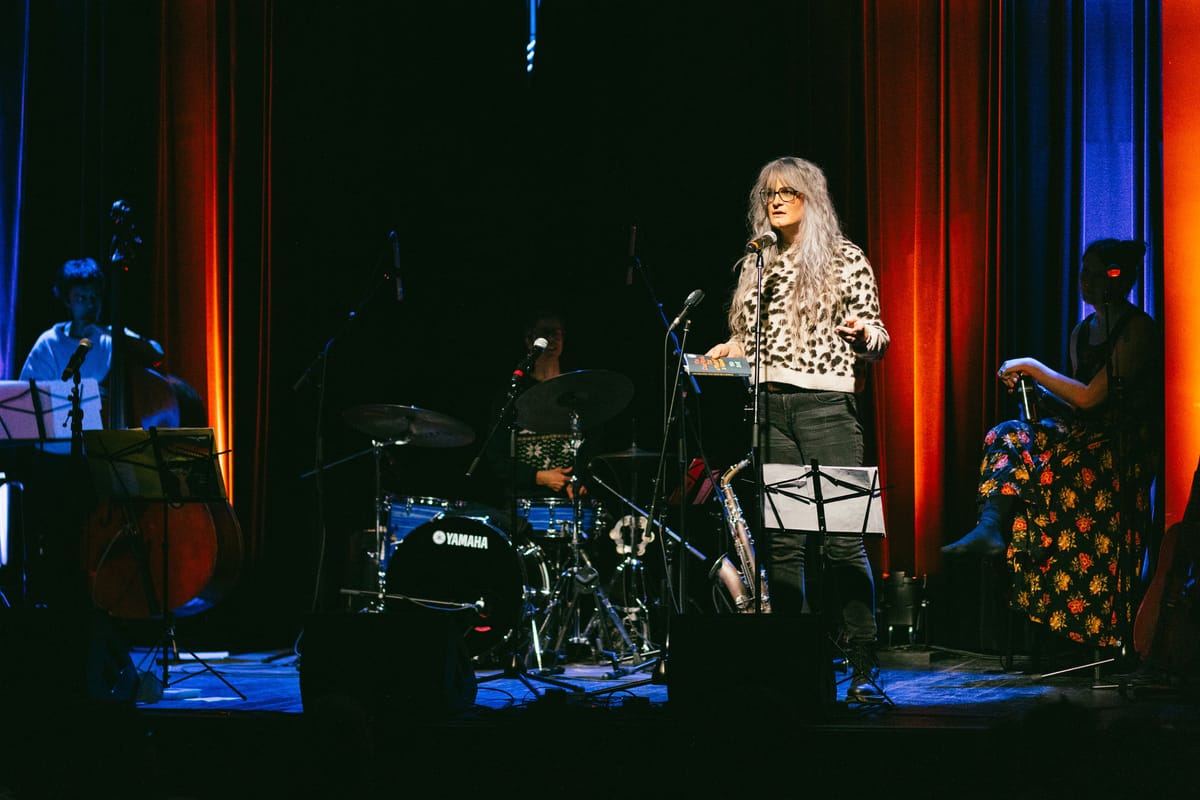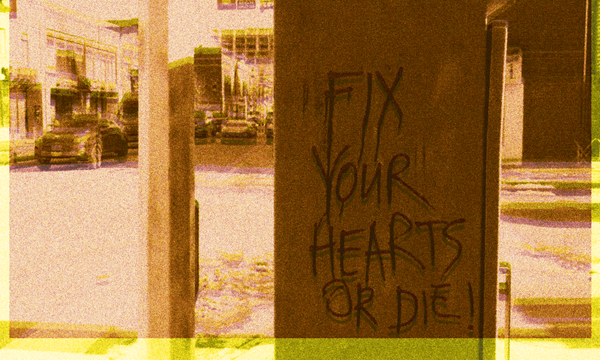Don't Worry About The Cost

Note: this is a piece I wrote to read on stage for The Basement Revue, a yearly music/literary variety show here in Toronto. I thought it would be nice to include it here in the newsletter at the end of the year as well. If you'd like to see a video of me reading it joined on stage by Toronto's Queer Songbook Orchestra (who also followed my reading with a beautiful cover of "Martha") you can see that at the end.
There’s a version of my past that I can no longer see. I blame Apple and iCloud for colluding against the storage of my life, but in truth it’s that I changed my name more than once, and with new accounts to fit each new era, those in the rearview fell into the faded neon abyss of the forgotten internet. A digital landfill of old passwords slowly misremembered, keys to the gates of email address whose correct spelling I’m no longer confident in. The name I was born with and all its former attachments has become something foreign and lost to me, relics of a dying sun, and for the most part, I’m comfortable with this. I tell myself that I need my past less as I get older, that the more recent and urgent memories are the ones worth holding on to, but there are times when I would like to look at a photo and remember where and when and who I used to be and that is just harder now. Harder because I didn’t sync my photos and memories to their new homes and harder because I wanted to hide from myself and harder because I drank so much for so long that it burned holes onto faces in photographs in which I was never real.
Not to talk about Twitter on such a lovely evening, but in a better time I tweeted “I can tell everything about a person based on when they entered their Tom Waits era”, and I firmly believe that to be mostly true. I was 23 when my own began, I took a date to Sam Mendes’ morose war drama Jarhead and walked away enamoured with “Soldier’s Things”, a Waits track that appears on the films' soundtrack. In the car home my review of the movie was that I liked it okay, but I loved that song and as a gift, a few days later the woman I went with made me a mix CD with “Martha” from Waits’ debut Closing Time as the closing track. I cherished that disc even as our relationship slowed its own passionate growth. I can’t really remember any of the other songs on the CD, but I can almost remember where we were when we held on to each other and I can remember Tom Waits songs that still felt new spinning on a shitty portable boombox perched delicately on a metal table on a tiny apartment patio. I can remember the delicate sting of nicotine in my throat as we smoked cigarettes in the bitter air of a long, dark winter. I can remember how it felt to leave, I just can’t remember our faces when the last goodbye was shared between us.
In transition, it’s easy to want to forget your past. There are troubles and painful things behind you as there are ahead, but all the blades that are still to cut don’t hurt nearly the same as the ones that have touched my skin before. I can remember how it felt to hurt and the pain that was will always be worse than pain still to come. The memories are often too hard, too real, too much. But I am older now, and while the blades of the past still hurt I’ve come to crave the pain they deliver in revisiting old days. There are flashes of days in my memories that I wish I could see and share, and what hurts more than sharp memories is the truth that so many years are difficult to remember. Time has eroded and fallen into loose pits of recollection, snippets of the past as precious commodities in the present. We could trade the days of our youth as fine metals, weigh them out and give them value as the years compound into a dense mass of monstrous beauty. The past is a bull market, only generating real value when you are old enough to yearn for images of days gone to become real once again.
Tom Waits’ name conjures an image. A tattered fedora sitting atop perfectly wild hair and the madness of the man below it all, his voice like a lion howling into a tin can. Waits’ career took him from a piano man singing ballads in shitholes and dive bars to a man seemingly possessed of demons, compelling him to create music that sounds like what a Hieronymus Bosch painting looks like in a dimly lit room. Haunting and full of secrets. This is all artifice, a self-created mythology honed and sharpened over time. The exaggerated performance of a man, stalking the stage, yelling into a megaphone. But he wasn’t always so. He was once so young, and like so many young men possessed of great desires, he set about becoming older than his years.
The cover of Closing Time is Waits, his hair dirty blonde and untouched by time, illuminated by a lonely light as he leans on a piano adorned with discarded liquor bottles and the coffin of a collapsing pack of cigarettes. The opening salvo of Waits as a performance of the kind of man he might grow up to become. The melancholic premature nostalgia of a young person desperate to be multiplied in age, burdened with regrets so as to sing beautiful and mournful ballads to weathered taverns populated by contemporaries of a shared heartache. In his earliest days, Waits played the part of an old man he would never grow up to become, like a young man dressing up as the idea of his father, not able to imagine how the years might change him and allow him to grow beyond the than trace outlines of a life.
We are all of us uncertain of who we will become. In my 20s and into my 30s my days felt disposable, cheap temporary tattoos soaked into the skin by a damp sponge, waiting to peel and fall away. I wanted to be old so I could get all of this over with, envisioned myself as the sad and lonely version of the idea of a man, not capable of imagining myself as the woman I might become.
“Martha” is written in the voice of an old man despite Waits being only 24 years old when he wrote it. An old man desperate to hear a response from a life he once held so desperate and dear to his heart. Waits announces himself on the telephone as Frost, making a long-distance call — not collect, don’t worry about the cost he says — to his own idyllic past. We don’t know if Martha answers, or if this is simply the late night ramblings of a man more invested in spilling words onto the spinning tape of the other side than he is with conversations or response. But the conversation feels less important than the desire that rang the line.
In my own memories, I am sometimes young, and I am sometimes young pretending to be older than my years, but I no longer have the photos to prove this, just flashes here and there. I have a video of my niece at Christmas the year before I transitioned laughing and telling me that I look crazy. I have one photo from that same day that proves her point. Wild hair, untidy beard. Eyes tired from drinking my way through pretending this was the life I had wanted for myself. I was young enough still, but aged all the same. Mid-30s. Skin worn and tired, marked by decades of the performance of a life.
Waits-as-Frost sings to Martha and himself and all that really mattered then was that I was a man.
“Martha” is captured in memory, like a voicemail, like an old photograph. Old Tom Frost is happy for her — she got married, she had kids, she has lived a life in the years since they parted. 40 years or more. And now, after all this time, he is dreaming of the past they once shared together. Yearning for the past as sanctuary from the loneliness of the present. Frost makes note of his own marriage, but he is making a non-collect call to an ex-lover decades after their parting asking to have coffee and that is not the phone call of a man happy within his station. That is the desperate phone call of a man eager to attach some misplaced truth to the days that linger in his mind, idyllic memories and half-truths that are nice lies to tell ourselves to make sense of all the days that lead to challenges of the present.
Those were days of roses, poetry and proses Martha all I had was you and all you had was me
This is a sad song. When I talk to people about Martha, there is a shared agreement that this is perhaps Waits’ saddest song. It’s raw and tender. A friend told me that the first time he heard it he just had to sit in his car for a little while and let the words and weight of it all roll off him. What’s perhaps saddest of all is that Waits had not yet begun to grow old enough to feel the kind of mournful regret of a Tom Frost. A young man, playing old, already preparing to feel the weight on his soul of his wild years. Tom Frost is the ghost of Christmas Future for a certain kind of man who lives a certain kind of life. Tom Waits would never become Tom Frost, and some days I like to imagine that Martha and Tom Frost are one and the same. That Martha is the version who lived, who chose, who loved, who grew old, who grew tired, who became happy. Tom Frost is the bitterness of not being able to choose a life worth remembering.
Choosing a new life, a new gender, a new name, new email addresses with new passwords was a blessing that saved me. This right to choose is a blessing we all deserve, to be active participants in how we safely grow old into the future and what we might look like when we get there. We deserve to hold on to the pain of our memories, and know them as just the spinning tape on the other side of the past. We deserve the opportunity to grow beyond the cut of the keen edges of our painful origins.
Some days when I want to recall my own past, the days and photos lost to bad iCloud syncs and poor data managment I have to remind myself that maybe I remember all that I need to. Maybe I know enough, I feel the sting of days past on my skin even without the photos, and the few I still have are all the evidence required to remember that in my youth I felt so close to the edge, and it’s only when I chose to live, to love, and to grow old that I began to worry about holding on to the days that I have and the memories of them. Like Tom Waits who grew into the performance of the man he wanted to be, the growling voice and the haunting soundscapes, my own old Tom Frost never came to pass. But I can remember, I will always remember, quiet evenings, trembling close to you.




